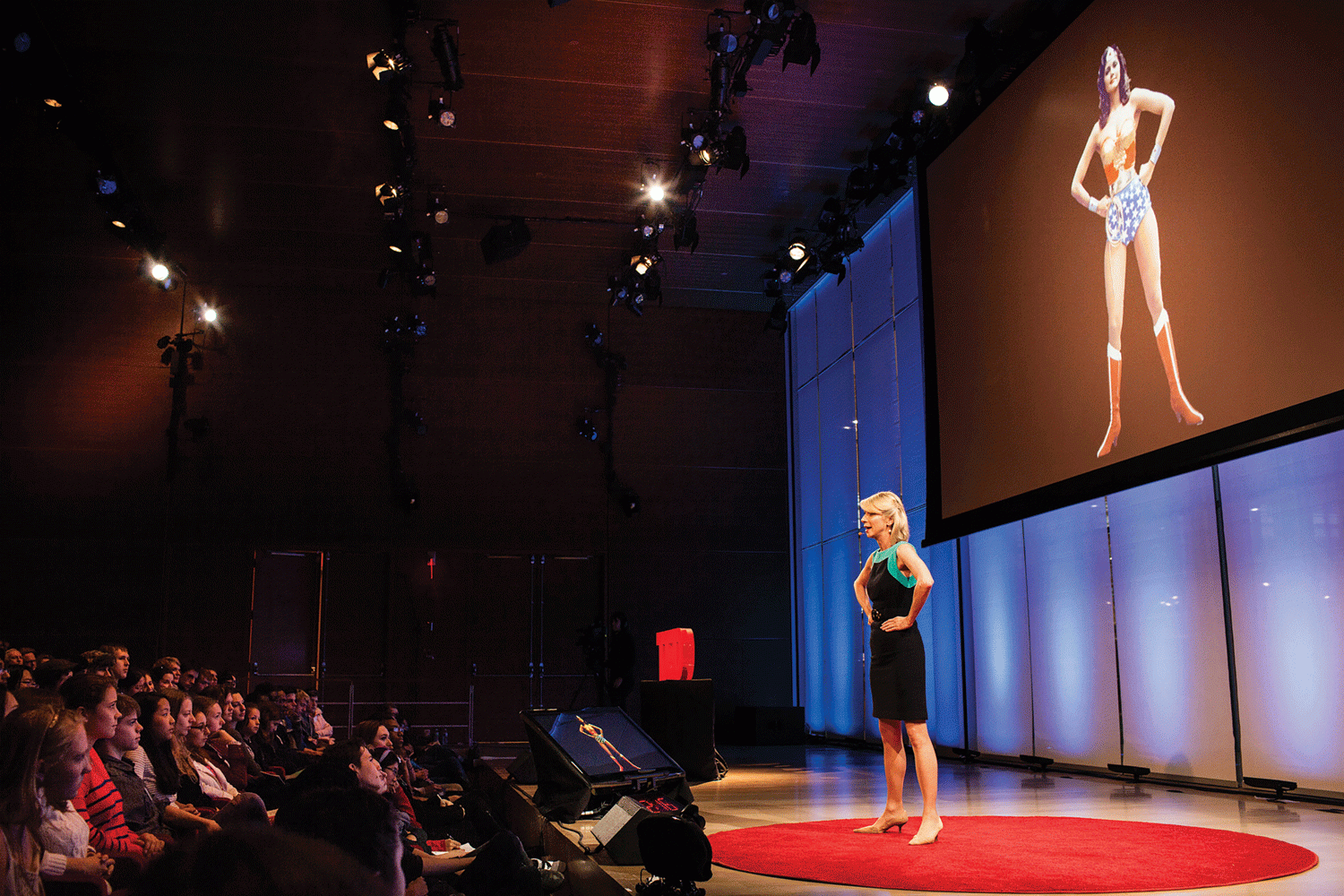
Of Mind and Matter

Amy Cuddy's TED Talk is the second most viewed of all time — and just a taste of what she has to say.
Long before Amy Cuddy was a Harvard professor and a TED star, she was an ambitious college student, the kind who would drive 900 miles through the night to make morning class in Boulder.
That’s what she and two friends were doing the night their Jeep Cherokee rolled over on a Wyoming highway en route from a conference in Montana. Asleep in the back seat, Cuddy (Psych’98), then a 19-year-old sophomore, was ejected. Her skull fractured on the road.
[video:https://www.youtube.com/watch?v=Ks-_Mh1QhMc]
Watch Amy Cuddy's TED Talk.
The prognosis was grim. Her IQ fell 30 points, language baffled her, doctors said to forget about college. But this was an intolerable thought.
“I had a very simple idea of who I was,” she told a Boulder audience earlier this year, “and being smart [was] part of that.”
Cuddy resumed school, stopped, started again. She spent a lot of time at a Boulder rehabilitation hospital.
The ballerina from rural Pennsylvania kept at it.
She worked as a rollerskating waitress at L.A. Diner on 28th Street, discovered social psychology, wrote an honors thesis and, four years after her original CU-Boulder classmates, graduated — magna cum laude.
She went on to graduate school in psychology at Princeton and, in 2008, joined the faculty at Harvard Business School, where she studies and teaches the psychology of persuasion, power and negotiation.
Cuddy’s efforts to overcome her head injury provide a moving context for her subsequent academic research about how the body influences the mind and the implications for everyday life. Aspects of her work served as the basis for a massively popular TED Talk that has inspired people around the world and catapulted Cuddy into the front ranks of public intellectuals.
Time named her to its 2012 list of “Game Changers” and Business Insider to its 2013 list of “50 Women Who Are Changing the World.” Science magazine ranked her among the “Top 100 Most Followed Scientists on Twitter.” She’s currently one of the World Economic Forum’s “Young Global Leaders.”
“The words ‘it can’t be done’ or ‘it is too difficult’ simply are not in her vocabulary,” said Bernadette Park, the CU-Boulder professor who was Cuddy’s honors thesis adviser. “What she has accomplished is truly remarkable.”
In the 21-minute TED Talk, “Your Body Shapes Who You Are” — the second most-viewed of all time, with more than 33 million views on the TED site and millions more on YouTube — Cuddy focused on the self-confidence many people generate by adopting “power poses” before stressful situations, such as job interviews, negotiations or speeches, and how this can influence outcomes in their favor.
In high-power poses we expand our bodies to occupy lots of space — assuming wide stances with arms on hips or extended above the head, maybe in a triumphant V, for instance. Cuddy calls them “postures of victory.”
Research by Cuddy and others has shown that holding high-power poses for two minutes can increase a hormone that induces feelings of power (testosterone), decrease a hormone that induces feelings of stress (cortisol) and embolden people to take risks.
Holding low-power poses for two minutes (a fetal position, say) has the opposite effects.
“Your body,” Cuddy said, “is always in conversation with your mind.”
Other research showed that we tend to respond more favorably to individuals — job applicants, for example — who exhibit personal power through a palpable sense of presence.
The TED Talk made Cuddy a star, but power posing is just one aspect of her broader interest in the dynamics of personal power and the ways people evaluate and influence each other.
Still, the talk has led to other big opportunities, including a book project, Presence: Bringing Your Boldest Self to Your Biggest Challenges, a New York Times bestseller published in December.
For the book, Cuddy widened her lens, distilling and personalizing a vast body of social science research about ways people can elicit a relaxed, confident, honest persona in stressful situations. The fundamental idea is to induce a state of presence, which she defines as “the state of being attuned to and able to comfortably express our true thoughts, feelings, values and potential.”
Like power posing, being authentically present leaves people relaxed and able to access their best and boldest selves in stressful moments, increasing the odds of desirable outcomes and all but assuring a satisfying sense of having done their best, irrespective of outcome.
For a long time this wasn’t natural for Cuddy, who endearingly exposes her own past struggles to summon her best self in high-stakes encounters with peers, professional superiors and others.
She learned, she said, to “fake it until you make it,” a mantra she’s modified based on her research results. Now she tells people to “fake it until you become it.”
Cuddy combines grit and high-caliber smarts with an open enthusiasm for pop culture. A serious live-music fan and self-described “Dead Head,” she sprinkles references to pop-culture figures throughout her writing and in conversation — musician Dave Grohl of Nirvana, writer Neil Gaiman and actress Julianne Moore all come up.
Cuddy continues to teach at Harvard, where she’s an associate professor, but also spends a lot of time talking about her work to general audiences at high schools, homeless shelters, churches and public halls.
“I care about talking to people outside the ivory tower,” she said. That’s not to say college towns have lost their appeal: Cuddy and her husband have considered buying a part-time home in Boulder.
“I want to get back out here,” she said during her winter visit. “The balance is right here.”
Photos by Ryan Lash (top); James Duncan Davidson, Ryan Lash

